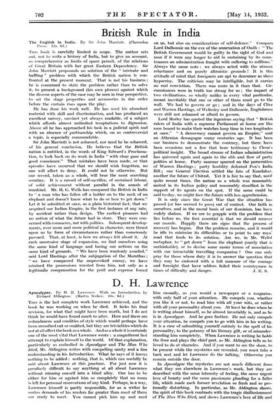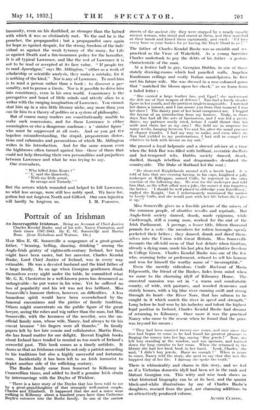D. H. L awrence
Apocalypse. By B. H. Lawrence. With an Introduction by Richard Aldington. (Martin Seeker. 10s. 6d.) Tins is the last complete work Lawrence achieved, and the book he was working on when he died. It lacks his final revision, for what that might have been worth, but I do not think he would have found much to alter. Here and there arc redttndances and crudities of style which would perhaps have been smoothed out or omitted, but they are trivialities which do not at all affect the hook as a whole. And as a whole it is certainly one of the most vital that Lawrence wrote : a magnificent last attempt to explain himself to the world. Of that explanation, particularly as embodied in Apocalypse and The Man Who Died, Mr. Aldington writes with compelling sanity and a fine understanding in his Introduction. What he says of it leaves nothing to be added : nothing, that is, which can usefully be said about Lawrence at this juncture. For just now it is peculiarly difficult to say anything at all about Lawrence without running oneself into a blind alley. One has to be either for him or against him so completely that no room is left for personal reservations of any kind. Perhaps, in a way, Lawrence himself is partly responsible, for as a writer he makes demands of his readers far greater than most of them are ready to meet. You cannot pick him up and read
hint casually, as you would a newspaper or a magazine, with only half of your attention. lie compels you, whether you like it or not, to read him with all your wits, or rather with all your personality about you. At least he does when he is writing about himself, as he almost invariably is, and as he is in Apocalypse. And he goes further. He not only compels your attention, he compels you to go with him in his writing. It is a case of submitting yourself entirely to the spell of his personality, to the potency of his literary gift, or of misunder- standing him completely. When Lawrence is writing he holds the floor and plays the chief part, as Mr. Aldington tells us he loved to do at charades. And if you want to see the show, to be present while the mysteries are revealed, you must take a back seat and let Lawrence do the talking. Otherwise you remain outside the door.
In Apocalypse the mysteries are not much different from what they are elsewhere in Lawrence's work, but they are described with the same intensity of feeling, the same urgent love of beauty and the same passionate pleading for a fuller life, which made each former revelation so fresh and so pro- foundly disturbing. In particular, as Mr. Aldington shows, the spirit of this book contrasts with the tragic disillusionment 'of The Man Who Died, and shows Lawrence's love of life and
humanity, even on his deathbed, as stronger than the hatred' with which it was so obstinately met. To the end he is the preacher, the propagandist ; but a propagandist once again for hope as against despair, for the strong freedom of the indi- vidual as against the weak tyranny of the many, for Life is against Death and a lire-insurance policy for the hereafter, It is all typical Lawrence, and like the rest of Lawrence it is not to be read or accepted at its face value. " If people try to read Apocalypse," says Mr. Aldington, "either as a work of scholarship or scientific analysis, they make a mistake, for it is nothing of the kind." Nor is any of Lawrence. To read him is to read a person rather than a book : to discover a per- sonality, not to peruse a thesis. Nor is it possible to drive bins into consistency, even in his own world. Consistency is the prerogative and boast of little minds and utterly alien to a writer with the ranging imagination of Lawrence. You cannot shut him up in a nice little literary niche, any more than you can tie him to a theory of politics or a system of philosophy.
But of course many readers are constitutionally unable to make such concessions, and for them Lawrence is either meaningless or else a dangerous madman : a sinister figure who must be suppressed at all costs. And so you get the hopeless misunderstanding, the stupid, preposterous distor_ Cons and calumnies and persecutions of which Mr. Aldington writes in his introduction. And for the same reason even the highbrows often turned against him--those of them that could not help thrusting their own personalities and prejudices between Lawrence and what he was trying to say.
One remembers,
"Who killed John Keats 1" " ' I,' said the Quarterly, 'With my little arrow, So savage and Tartarly.' "
But the arrows which wounded and helped to kill Lawrence, no whit less savage, were still less nobly sped. We have for_ gotten but not forgiven North and Gifford. Our own injustice





































 Previous page
Previous page